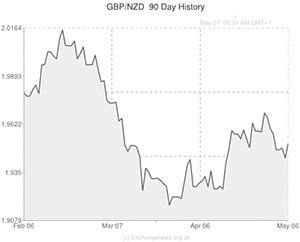
The Pound to New Zealand Dollar exchange rate (GBP/NZD) rallied by around a cent from 1.9400 to 1.9500 late on Tuesday night in reaction to a softer-than-expected New Zealand Unemployment Report. The headline jobless rate disappointed forecasts of 5.8% by remaining at 6.0% during the first quarter.
The knee-jerk reaction to the data: a one-cent decline in the value of the ‘Kiwi’ Dollar against Sterling, reflects a feeling of anxiousness around the Antipodean currency. The Reserve Bank of New Zealand has already raised interest rates by 0.50% to 3.00% so far this year, and policymakers at the Bank have hinted that the benchmark rate could reach a peak of 4.75% over the next few years.
However, this much is already priced into the market: investors expect rate hikes. If domestic data does not live up to expectations and, for whatever reason, the RBNZ decides to put its tightening cycle on hold then it is entirely possible that jittery traders could look to lock-in profits and move out of long NZD positions. This would have a detrimental impact on the New Zealand Dollar exchange rate.
However, it is still relatively likely that the Central Bank will continue to hike interest rates because, although the headline Unemployment Rate failed to fall, the underlying view of the labour market remains a positive one.
On a quarterly basis employment improved by 0.9% in the first three months of the year and on a yearly basis employment accelerated by 3.7%. The only reason that the headline jobless rate didn’t recede is that the Participation Rate jumped from 68.9% to an all-time high of 69.3%, which, if taken independently, is actually a positive indicator because it suggests that people in New Zealand are optimistic that there are jobs available to them.
UK Services PMI
Sterling performed well against the majors yesterday, posting a 2-month high against the Euro and a fresh 4.5-year high versus the US Dollar in response to an extremely positive UK Service Sector PMI score of 58.7, which beat predictions of 57.8 and represented the highest print for 5-months. The report, which measures around 75% of total British economic output, showed that job creation surged in time to the beat of rising demand. This augured well for future GDP scores and caused some investors to bring forward their Bank of England rate hike predictions.
The Pound to Euro exchange rate (GBP/EUR) breached psychological resistance at 1.2200 briefly, whilst the Sterling to US Dollar exchange rate (GBP/USD) came within 3 pips of breaking through significant resistance at 1.7000.
Pound to New Zealand Dollar update – 08/05/14
The Pound softened against the New Zealand Dollar on Thursday after the UK currency was under pressure ahead of the Bank of England’s policy rate decision.
Market sentiment towards the New Zealand Dollar was boosted after official data released overnight on Thursday showed that Chinese imports and exports
both rose slightly in April from a year earlier, confounding forecasts for them to decline.
The data eased concerns over a slowdown in the world’s second-largest economy and New Zealand’s largest trade partner.
The next major domestic data release for the ‘Kiwi’ comes on Tuesday when the latest retail sales data is released.

Comments are closed.